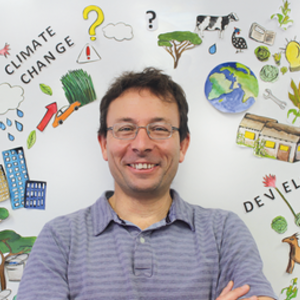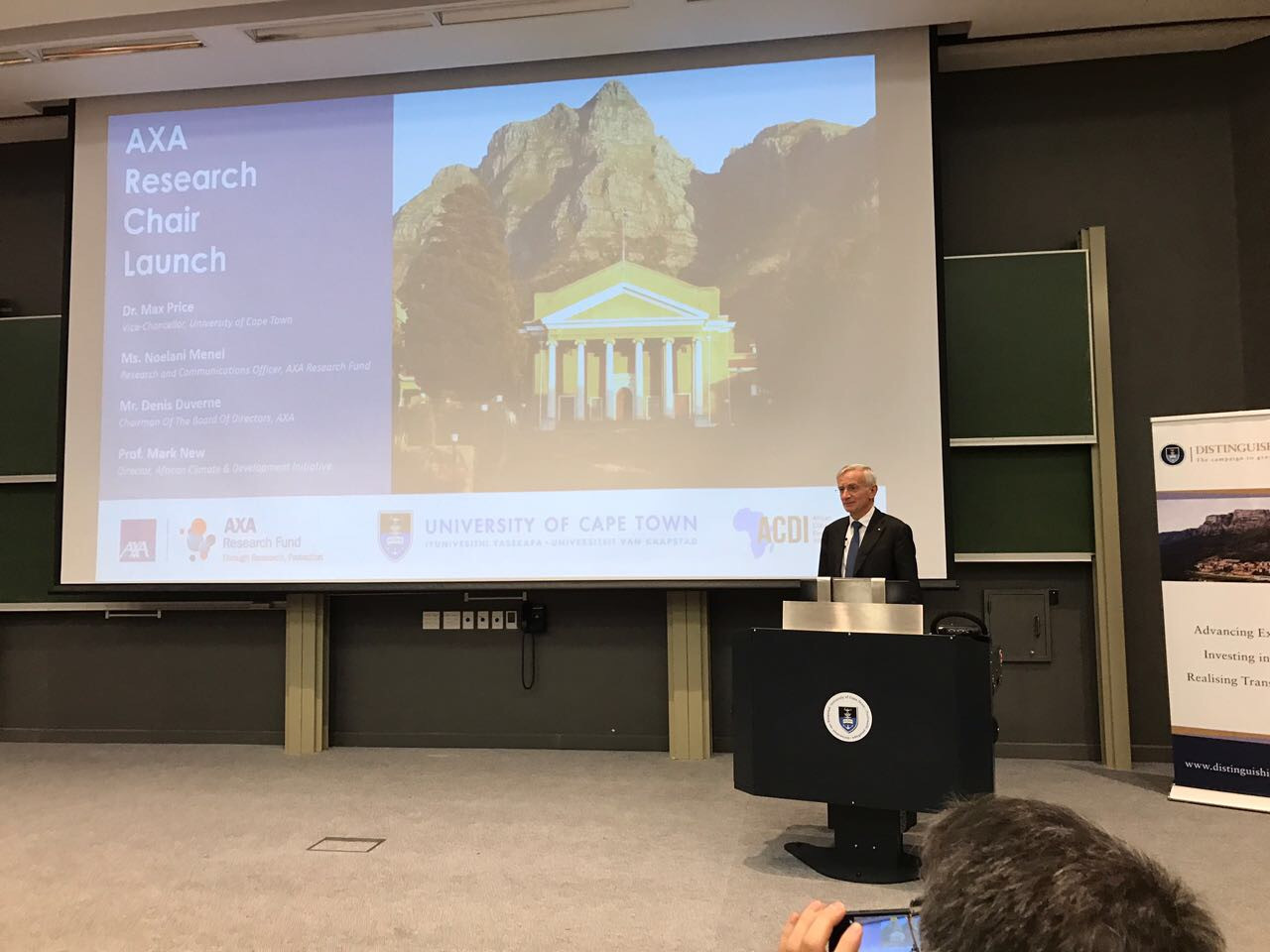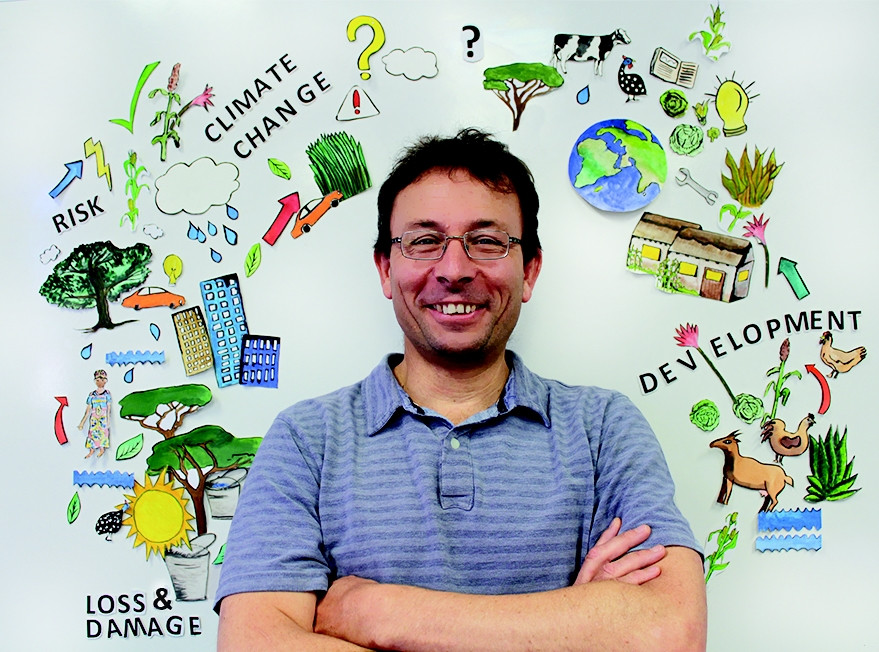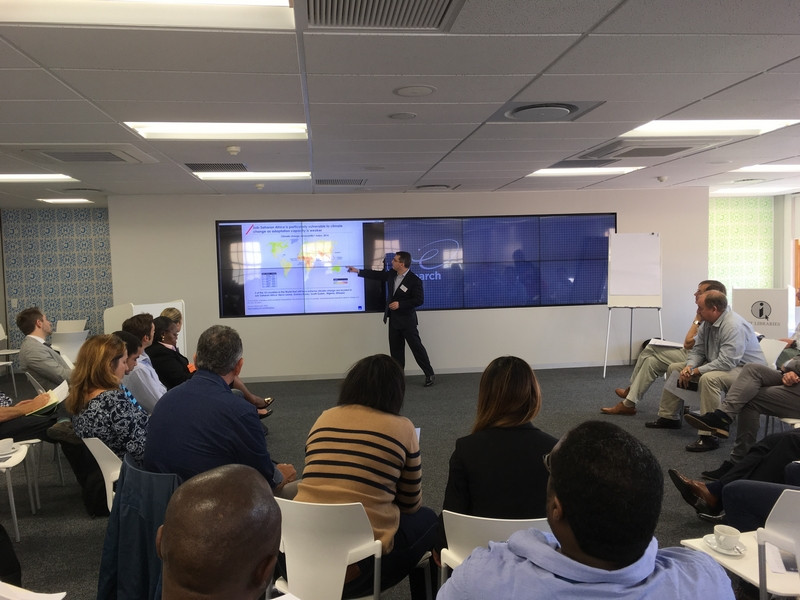New AXA Chair in African Climate Risks Pr. Mark New

Brace for frequent extreme weather
Professor Mark New, holder of the recently launched AXA Chair in African Climate Risk, a first of its kind in Africa, warns that climate change has loaded the dice in favour of disastrous weather.
The severe two-year drought that is currently laying waste to the Western Cape’s water supply might see its ilk visit twice as frequently as before, thanks to the destructive consequences of global warming and climate change. This is according to Professor Mark New, the newly appointed head of the AXA Chair in African Climate Risk at Cape Town University (UCT).

Ominous preliminary data suggests that extreme weather events might be twice as likely to occur, with an intense drought like this landing once every 25 years rather than once every 50 years, says Prof New. If these readings are confirmed, the Western Cape water supply system will need to be rethought. Currently, it’s designed with two disastrously dry seasons per century in mind.
“Climate change has loaded the dice,” says New, who directs UCT’s African Climate and Development Initiative.When we’re thinking about risk management and water resource system management, it’s based on those kinds of probabilities, says New.“If your input data to the design of your water system is wrong because the dice has been loaded, then you need to change your input data.”
That’s where New and his colleagues come in.
The AXA chair, which was launched on 6 April 2017, is the first of its kind in Africa. The global insurance leader AXA supports this Chair for 15 years of research that will inform better management of resources to cope with climate change risks. New is the first holder of what AXA calls a successional chair – a new scholar will be appointed every five years.It would help entice the best climate change researchers to set up shop at UCT. “It’s an opportunity to develop the careers of researchers who are close to being at associate professor level,” says New.
What can we blame climate change for?

Professor New’s area of climate science expertise is called attribution.
“It’s basically asking to what extent greenhouse gases are changing the climate risks that we’re exposed to,” New explains. “Say we have a heavy rainfall event that causes a lot of flooding in Cape Town. Is that climate change?”
The simple answer, says New, is not so simple. There have been extreme weather events since before greenhouse gases began polluting the atmosphere.
“What we can say is how global warming is changing the frequency and intensity of those events,” he says.”If the risks are changing – and the research suggests that they are – the way we manage those risks must change, too.
Evolvoing risk landscape demand different management of resources
Take the Western Cape’s water supply as an example.
The province draws the bulk of its water from a man-made confluence of the Berg River, the upper Breede, the Steenbras and the Palmiet. This system assumes a catastrophic drought every 50 years. It’s thus designed for 49 reliable yields every half-century.
But with more frequent droughts a real possibility, especially when these droughts last for two years, the system might be in need of rethinking, says New.
“We talk about distil and proximate risks,” says New.
The distil risk is global warming changing climate and rainfall. The proximate risks involve the ways that people-made landscape systems affect our sensitivity to the global-scale risks. When flooding is on the table, think roofing on houses, drainage and storm-water systems, whether rivers are in concrete canals or natural channels, and so on.
“My house on the slopes of Table Mountain would never get flooded because the extreme rainfall just goes underground,” he says. Somebody in an informal settlement on the Cape Flats will most likely see their home flooded, because the groundwater table rises and floods.
“So we’re interested in how the human management of the landscape is changing the sensitivity to those external rainfall events and how we can change the landscape to reduce that risk. That then helps the people who have to manage the risks to figure out how they need to change their risk-management strategies to ensure safer and better life conditions.”
The big question

New’s big question, then, is how exactly the risk has changed, and they’re working towards a final answer.
“We need to do a lot more work to get to a much more robust statement of how the risk of an event of this magnitude has changed, but it looks like the risk has changed because of climate change,” says New. “We are extremely proud to support this unique research programme, Mark New and the team of researchers, who are actors of change regarding climate science in Africa, and working for a better future,” said Raphaël Gusdorf, Acting Head of the AXA Research Fund.
The AXA Research Fund, the science philanthropy initiative of the AXA Group, is also supporting key health research being conducted at the University of Cape Town: Nadia Chanzu working on improving mothers’ immune system regarding HIV and preterm birth, and Abhimanyu Abhimanyu who aims at predicting tuberculosis in populations at risk.
Story Yusuf Omar. Photos Michael Hammond / Robyn Walker.
Discover research projects related to the topic
Climate Change
Economics
Financial & Social Inclusion
Climate Adaptation & Resilience
Insurance & Risk Management
Environmental Justice
Civil Society & Governance
AXA Project
Italy
AXA Research Lab on Climate Change, Risk and Justice
In response to three research questions: How can the private and financial sectors contribute to a just transition to a... Read more

Gianfranco
PELLEGRINO


